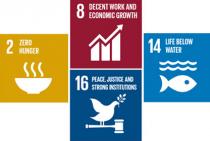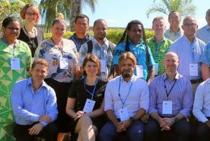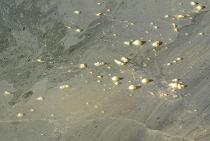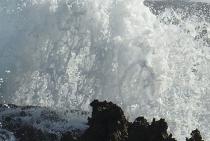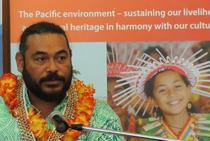An exhibition explaining the science behind climate change and its effects was officially launched on 11 June at the Taufa’ahau Tupou IV Domestic Wharf. The exhibition was initiated by scientists working in Antarctica who felt the public needed to be informed about the impacts they were seeing caused by climate change.
You are here
Results for environment
Tuesday 11 June 2019
 Premium content
Premium content
Nuku'alofa, Tonga
Tuesday 28 May 2019
Bangkok, Thailand
A new United Nations report on Sustainable Development Goals (SDGs) progress urges countries to redouble efforts. On its current trajectory, Asia and the Pacific will not achieve any of the 17 SDGs by 2030. Many SDG targets related to the environment and natural resources are registering negative trends. Hazardous waste generation, the reduction in forest areas and the permanent water body extent are the three SDG indicators which are predicted to regress the most by 2030, compared to 2015.
Tuesday 28 May 2019
 Premium content
Premium content
Apia, Samoa
Representatives from 15 Pacific islands are meeting in Apia, Samoa, from May 27-29 for the PacWaste Plus Inception Meeting, looking at ways to reduce the production of, and improve the management of, hazardous wastes, solid wastes and related aspects of waste water in their countries, aiming for a Cleaner Pacific by 2025.
Monday 27 May 2019
Stockholm, Sweden
Earlier this month, a bleak global assessment of the shocking state of life on Earth made headlines worldwide. According to the report by the Intergovernmental Science-Policy Platform on Biodiversity and Ecosystem Services (IPBES), about 12% of all known animal and plant species are now threatened with extinction. Worse still, humanity is destroying entire habitats, and with them the web of life that supports societies and economies. Unsurprisingly, the findings were greeted with despair. By Ana Paula Aguiar, Odirilwe Selomane, and Pernilla Malmer.
Monday 11 March 2019
Berlin, Germany
We have long known that the accumulation of plastic in the world’s landfills and oceans represents a growing environmental risk. More recently, we have come to understand that plastic poses an urgent – even deadly – threat to public health, too. And yet, global efforts to address the plastic crisis remain consistently focused on the wrong end of the life cycle: waste management. The debate that will resume this month at the United Nations Environment Assembly (UNEA-4) is a case in point, because it will focus on “marine litter and microplastics.” By Lili Fuhr and Jane Patton.
Wednesday 6 March 2019
Nuku'alofa, Tonga
I think many Tongans, including myself, are concerned over what is occurring with the Government’s development projects at Popua. ...Someone in the Government must speak up and take action or they will be held accountable by future generations who are impacted by these decisions. - Tevita ‘Ita.
Thursday 20 December 2018
1 comment
Katowice, Poland
The Ocean is an integral part of our climate discussions and cannot be spoken about in isolation, stressed Samoa's Prime Minister Tuilaepa Aiono Sailele Malielegaoi at a high-level panel discussion event during COP24 in Katowice, Poland.
Thursday 13 December 2018
 Premium content
Premium content
Nuku'alofa, Tonga
A thin layer of brown scum has appeared on the surface of the public swimming pool at the waterfront in Touliki this week, raising concerns on the water quality of the popular site. It's particularly noticeable on the northern edge of the pool when the water is flat in the morning. By Eleanor Gee
Friday 26 October 2018
 Premium content
Premium content
Nuku'alofa, Tonga
Tonga understands deeply the impact of environmental changes because they directly affect these islands, said the Duke of Sussex, Prince Harry, during a visit to dedicate two Forest Reserves at Tupou College this afternoon. Tupou College singers were a hit with their variation of the Mosquito song harmony "Zing Zang Zung Zoon".
Tuesday 14 August 2018
New York, USA
This summer's fires, droughts, and record-high temperatures should serve as a wake-up call. The longer a narrow and ignorant elite condemns Americans and the rest of humanity to wander aimlessly in the political desert, the more likely it is that we will all end up in a wasteland. But instead of a Moses guiding humanity in this new and dangerous wilderness, a gang of science deniers and polluters currently misguides humanity to ever-greater danger. We are all climate refugees now and must chart a path to safety. By Jeffrey D. Sachs.
Tuesday 24 October 2017
 Premium content
Premium content
Manila, Philippines
The Earth today is more than 1°C hotter than it was in pre-industrial times, and the terrible symptoms of its fever are already showing. This year alone, back-to-back hurricanes have devastated Caribbean islands, monsoon flooding has displaced tens of millions in South Asia, and fires have raged on nearly every continent. Pulling the planet back from the brink could not be more urgent. Those of us who live on the front lines of climate change – on archipelagos, small islands, coastal lowlands, and rapidly desertifying plains – can’t afford to wait and see what another degree of warming will bring. By Loren Legarda
Thursday 19 October 2017
 Premium content
Premium content
Suva, Fiji
Fiji has become the first developing country to issue a green bond in its bid to raise $100m (US$50m) for climate change mitigation, adaptation, and other environmental-friendly projects.
Wednesday 11 October 2017
 Premium content
Premium content
Addis Ababa, Ethiopia
Least Developed Countries are calling on the global community to do more at the upcoming Climate Change negotiations (COP23) in Bonn, Germany, next month. Representing 47 of the world’s poorest countries, they are committing to fully support Fiji presiding over COP23.
Tuesday 29 August 2017
Nuku'alofa, Tonga
Climate change impacts are evident everywhere in the Pacific, where many communities are on the front line of its damaging impacts, said Australia’s Ambassador for Environment Patrick Suckling, who is visiting the Pacific region.
Tuesday 15 August 2017
 Premium content
Premium content
Manila, Philippines
Rising temperatures caused by climate change would be catastrophic for countries in Asia and the Pacific by the end of the century - unless countries work to mitigate it, says a report by the Asian Development Bank (ADB) released last month. Crops yields in the Pacific region will be in decline by 2050. By 2100, “all coral reef systems in the subregion will collapse due to mass coral bleaching if global warming increases by 4 degrees Celsius”.
Tuesday 15 August 2017
Honiara, Solomon Islands
In the Pacific region many of the natural disasters experienced are related to water and climate, Hon. Samuel Manetoali told the opening meeting of the Pacific Meteorological Council on August 14 in the Solomon Islands, saying "We are most vulnerable to the impacts of climate change... and climate variability". By Linny Folau in Honiara.
Wednesday 9 August 2017
 Premium content
Premium content
Suva, Fiji
Identifying opportunities the blue economy offers to Pacific Islands, so that they can sustainably manage and conserve their ocean resources to benefit their economies and people will be the focus at the first high level Pacific Blue Economy Conference to be held on 23-24 August 2017, in Suva, Fiji.
Monday 31 July 2017
 Premium content
Premium content
Nuku'alofa, Tonga
Tonga's King Tupou VI urged Tongatapu farmers to be more aware of the environmental impacts from the use of pesticides and chemicals, polluting the underground water supply, when the king opened the Tongatapu Royal Agriculture, Fisheries and Tonga-Made Show on Saturday, July 29 at the Funga-Mana-Mo’ui Grounds in ‘Atele. Photos by Linny Folau and Eleanor Gee
Saturday 15 July 2017
Oxford, United Kingdom
In recent years, the world has become increasingly preoccupied with the catastrophic potential of global warming and other human-induced environmental changes, and rightly so. But one of the most serious risks has been all but ignored: the threat to human health. ...Determined opponents will question the science and criticize those who claim that human health is being jeopardized by environmental disregard. But to these critics I pose a question of my own: “Are you willing to risk being wrong?" By Shaukat Aziz.
Monday 12 June 2017
1 comment
Washington, USA
I cannot over emphasize the potential gravity of development in and around the reclaimed Popua landfill. I recommended this area not be used for a landfill from its onset in the 1980's. I can't say how extremely disturbed I was to see the area around it now being developed as a children's park that I was told was being funded as a Chinese gift. Richard Stoll, environmental engineer.



